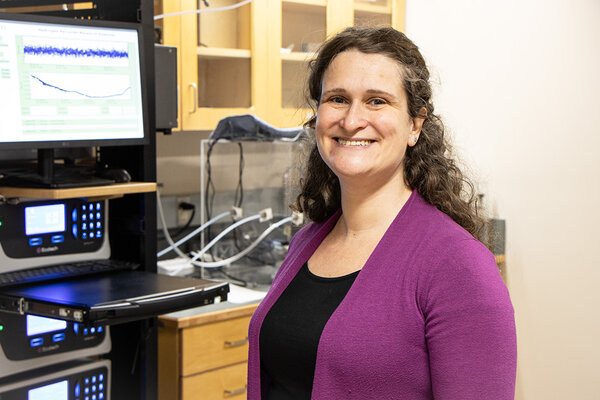
Nine U of S researchers awarded SSHRC Insight Grants
Six of the nine grants will help College of Arts and Science researchers answer questions about communities and society
Researchers at the College of Arts and Science received six of nine Insight Grants awarded to the University of Saskatchewan (U of S) recently by the Social Sciences and Humanities Research Council of Canada (SSHRC), with College of Education researchers awarded three grants.
The nine projects are worth a total of $897,000. The research ranged from engaging parents—particularly from newcomer families—in schools, to investigating how and when women decide whether or not to delay motherhood, to examining the wider social and economic impacts of moving to renewable energy systems.
"I congratulate these outstanding researchers on their success," said U of S Vice-President Research Karen Chad. “Their dedication, curiosity, and insight are providing new knowledge that helps us better understand our society, and shows how we can build stronger communities in the future."
Loleen Berdahl, professor and head of the political studies department, was awarded $60,500 to research Political Science Career Mentorship in Canada. Using political science as a case study, her research aims to understand why Canada’s social science and humanities PhD programs remain firmly oriented toward academic career options when there’s an oversupply of PhDs for available positions. Berdahl wants to generate practical recommendations for universities striving to provide effective programs.
Egan Chernoff, associate professor in curriculum studies, was awarded $75,500 to continue his investigation into how well future math teachers understand probability. Probability, which has become a staple of school mathematics curricula worldwide, is counterintuitive and difficult to grasp, he says. We are in the midst of a data deluge, making it important for teachers to be able to prepare students for navigating a world that continues to shift attention to data, chance and uncertainty, he says.
Karen Lawson, a professor in the psychology department, was awarded $87,000 for the project, Later baby! Psycho-social factors underlying the formation of intentions to delay motherhood. The research will increase our understanding of current fertility trends in Canada and the factors that underlie women’s intentions to delay motherhood, Lawson says. The findings could highlight possible ways—at the personal and public policy level—to enhance women’s ability to achieve their reproductive goals, and in turn impact national fertility rates.
Lachlan McWilliams, a faculty member in psychology, was awarded $93,300 for his project, Adult Attachment and Functioning of the Attention Networks. Attachment theory suggests that interactions with early caregivers lead to lasting expectations that guide adult behaviour in relationships. Two studies have shown that adult attachment insecurities (such as anxiety and/or avoidance) were counterintuitively associated with better attention skills. McWilliams is exploring this relationship to expand our understanding of the nature and influence of attachment insecurity.
Brent Nelson, professor in the English department, was awarded $146,200 for the project, The Social Network of Early Modern Collectors of Curiosities. His project intends to follow the movement of collected curiosities through networks of exchange to study how these objects were understood and regarded by those who would form the foundations of our modern museums.
Bram Noble, professor in the geography and planning department and in the School of Environment and Sustainability, was awarded $91,800 for researching Knowledge-based Impact Assessment for Renewable Energy Transition. While there is a history of impact assessment research and application in the fossil fuel sector, little is known about the impacts of renewable energy systems, says Noble. His research will add to the knowledge base needed to identify the impacts and manage renewable energy development.
Janet Okoko, assistant professor in educational administration, was awarded $78,700 for a study aimed at helping school principals to engage effectively with English as an Additional Language newcomer families in Saskatoon. Principals play a significant role in creating and nurturing a school culture that embraces diversity and the inclusion of all students and their families, she says. She will use interview and focus group information in developing ways to prepare school leaders to work with newcomer families and the make them feel welcome and encouraged to settle in Saskatoon.
Debbie Pushor, professor in curriculum studies, was awarded $184,500 to research what is required to systematically engage parents in their children’s teaching and learning at school, during children’s time away from school, and in educational opportunities for the parents themselves — such as adult learning or language classes. Decades of research show that parent engagement is linked to improved academic, social and behavioural performance of students, Pushor says. She will work with government agencies, the Saskatchewan School Boards Association, and Saskatoon Public Schools to develop a prototype for parent engagement in Saskatchewan.
Wendy Roy, professor and department head in English, was awarded $79,800 for her research project, Women of the Apocalypse: Writing the End of the World in Canada. End-of-the-world fiction is a commentary on the present, she says. Dystopian and apocalyptic fiction by Canadian women writers explores the nature of understanding and of expressing humanity in a world in crisis. A study of such fiction is especially relevant today because of increasing, tangible concerns about the devastating impact that current environmental, technological and political events might have on the world of the future.


